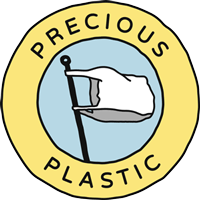
This article is part of Precious Plastic, a One Army project tackling the plastic waste problem. You can learn more
here.
For the past week, we’ve been in Kisii, Kenya to follow up on our Precious Plastic pilot we’ve started in back May with the Un-Habitat. The project is trying to create a self-sufficient plastic recycling workspace that can both clean up the environment and create local employment in rural Africa.

This second visit was shorter (1 week) and unsurprisingly full of learning experiences on how to set up a venture in Africa. First of which came from the realisation of our naïve assumption that leaving a bunch of people with a bunch of machines was going to be enough to create a successful project. We couldn’t be more wrong
In the first six months since we’ve set up the space a lot has happened. After a few successful months of learning, experimenting and making demonstrations the shaft of the shredder broke (auch), not sure what happened as it was hard to retrieve info about the cause of the failure. A stone, too thick plastic, too many vibrations- still a mystery. The guys tried to source a new hex bar and a lathe to make a new one by themselves but it wasn’t possible to find it in the region. We then sent a new hex from the Netherlands (two actually, one got ‘lost’ in the post) and they were up and running once again (the whole process took a couple of months ). Looking at the bright side, they were able to fix it themselves once they received the missing part.





Once they had the shredder back in place, the team was able to start producing products once again. They made bowls, tiles, lampshades as well as a number of interesting experiments. And right before we came, they were invited to sell their creations in a designer market in Nairobi. And they sold out.
However, an important feedback from customers concerned the quality and finishing of the products claiming that they “would pay more, if only the products were better finished and generally of higher quality”.



Facing challenges
As we returned to the space at the end of November we found three out of four machines out of service, only a few products & experiments, and worst of all a fighting team that couldn’t agree on how to cooperate and work together in a peaceful manner- (oh, and most of the official partners from the local government replaced during the last strenuous Kenyan elections). Grrrreat
Our original plans to do mould making workshops, create new products, teach how to finish products and how to use our Bazar immediately seemed irrelevant. It felt way more urgent to address the team first and build from there. We ended up talking a lot trying to rebuilding harmony in a divided team. The team was divided by tribal hierarchies, vague roles and responsibilities and jealousy outburst.
As often with Precious Plastic, we’ve rapidly pivoted on the original plans and focused on creating a framework for the team structure that could help participants understand more in details their responsibilities, commitments, duties and rewards. Every individual in the group has now a precise task, machine or duty to work on and be responsible for. Each person has to rely on other members of the group to work collaboratively and efficiently, hopefully strengthening the group’s bonds.
We have never done anything like this back home, let alone in Africa with their opposite cultural backgrounds, needs, realities, work ethics and standards. Within our team we work as collaboratively and openly as possible with little hierarchy. This is just how it comes natural for us. However, in Kenya we felt there was a need for clear roles and positions to avoid machismo and bullying. We’re confident we’ve left a solid structure and agile communication infrastructure to be more close to our Kenyan friends to try help them overcome machines and products failures in the upcoming months.






Another crucial change was to limit the outcomes of the workspace for the time being. This will help address the real-life feedback from customers that were asking for better quality. The team will now be making only bowls and lamp shades. No more tryouts and experiments but focus on fewer techniques and outcomes. We hope this will result in better quality products. Master one technique/product first, then move onto the next.




We’re looking forward to see how this will evolve and what other learning lessons we’ll gather in the next few months. This knowledge will be shared openly to our community so that if you too are thinking of starting a project in Kenya or another developing country with similar conditions you don’t have to start from zero again but can learn from our experiences, failures, mistakes, assumptions, successes and pivotal tricks.
Much love
Plastic Team






.svg)

